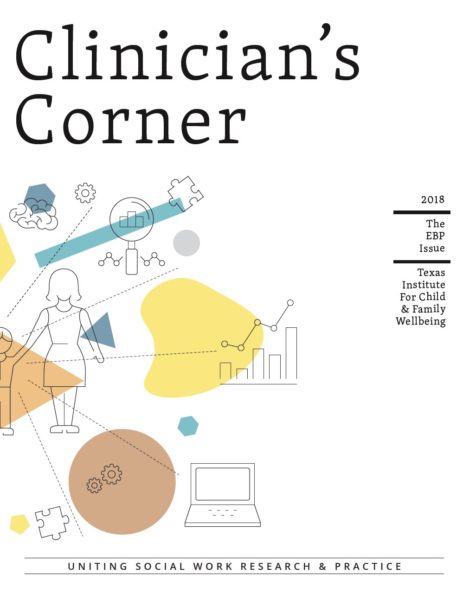Clinician’s Corner 2018: The EBP Issue
View the 2018 Clinician’s Corner here!
Download PDF of our 2018 Clinician’s Corner here!
Dear readers:
I am incredibly excited to share our second issue of Clinician’s Corner with you. As a researcher and social work practitioner, I often see a disconnect between the research on practice published in academic journals and what practitioners are actually doing to improve the lives of their clients. Last year, our team set off on a unique journey to bring together researchers and practitioners through the production of our first Clinician’s Corner. Our goal is to create an ongoing dialogue between researchers, practitioners and policymakers.
In this second issue, we have focused on evidence-based practice and we are proud to have several pieces that have been co-written by researchers and practitioners to facilitate this dialogue. Evidence-based practice has long been a source of conversation. On one hand, measuring and disseminating research evidence related to client outcomes has the opportunity to inform best practices and improve services to clients. On the other hand, the current use of evidence-based practice models has contributed to some feelings of frustration for many in the social work field. For example, academics may feel like practitioners should utilize the evidence they produce in academic journals, even though practitioners may be ahead of the research. For practitioners, using evidence-based practices can be stifling because of the perception that it can constrain clinical judgment. For policymakers, the use of evidence-based practices are often mandated in an effort to “guarantee” a defined result. Finally, for administrators, evidence-based practices can be costly pre-packaged models required by funders.
In our first article, my colleague Dr. Danielle Parrish from Baylor University, an expert in social work evidence-based practice, and I address some of these issues and the chaos we see in how research evidence is defined and used. Our argument is that evidence-based practices should not be conceptualized as static models. Rather, evidence-based practice is a process in which you, as the practitioner, review the available research and then use your clinical judgment to make the right choices with (not for) your client.
To help you through this process, we have articles in this issue written by researchers with clinical backgrounds to provide guidance on utilizing clearinghouses, making cultural adaptations to evidence-based models and the process of building evidence for an intervention. We also have several pieces that were authored by practitioners and researchers as a team. Barbara Jefferson from the Center for Child Protection offers insight into thinking through what a client needs and making the right choice of interventions. Debbie Okrina from Spirit Reins dialogues with our Associate Director, Dr. Beth Gerlach, about reservations with evidence-based practices and how the clinical relationship has to be at the forefront of practice. Finally, Rob Thurlow of Lifeworks discusses with Dr. Patrick Tennant supervision in the context of evidence-based practices. Our intention is to provide tools and dialogue to help practitioners be informed consumers of evidence-based practice.
Despite the breadth of the content we are providing, we recognize that we cannot capture all the complexities and nuances of evidence-based practice. However, our primary hope is that you walk away from this understanding that you and your client are at the heart of the evidence-based process because you and your client have to decide what is best for their wellbeing.
As you read, we invite you to be in touch with us to share your experiences with evidence-based practice so we can continue this conversation. We believe you are the expert on your practice and we want to know about your experiences, hear your questions and work together to find solutions. Look for future Facebook live sessions addressing these topics and please keep in touch with us.
Sincerely,
Monica Faulkner, Ph.D., LMSW
Director & Research Associate Professor, Texas Institute for Child & Family Wellbeing, Steve Hicks School of Social Work, University of Texas at Austin
